初中英语语法知识—动词时态的分类汇编及解析(4)
语法基础动词时态详解

语法基础动词时态详解动词时态是语法中的重要概念,它用来表达动作的时间。
掌握动词时态对于学习和理解英语语法至关重要。
本文将详细介绍动词时态的基础知识,帮助您更好地理解和运用。
一、动词时态简介动词的时态主要分为过去时、现在时和将来时。
它们分别用于表达过去、现在和将来的动作或状态。
在时态中,动词的形式会发生变化,以匹配主语的人称和数。
1. 过去时过去时用于表示过去发生的动作或状态。
一般情况下,过去时的动词形式是动词的过去式。
例如:- I played basketball yesterday.(昨天我打篮球。
)- He watched a movie last night.(昨晚他看了一部电影。
)过去时可再细分为简单过去时、过去进行时、过去完成时和过去完成进行时,它们分别用于不同的语境和句子结构。
2. 现在时现在时用于表示现在正在进行的动作或状态。
一般情况下,现在时的动词形式是动词的原形加上第三人称单数形式的“-s”。
例如:- I study English every day.(我每天学英语。
)- She plays tennis on weekends.(她周末打网球。
)现在时也可再细分为简单现在时、现在进行时、现在完成时和现在完成进行时,它们用于不同的语境和句子结构。
3. 将来时将来时用于表示将来要发生的动作或状态。
一般情况下,将来时的动词形式是辅助动词“will”加上动词原形。
例如:- They will visit their grandparents next week.(他们下周会去看望他们的祖父母。
)- I will finish my homework before dinner.(我会在晚饭前完成作业。
)将来时也可再细分为一般将来时、将来进行时、将来完成时和将来完成进行时。
二、动词时态的使用规则1. 过去时的使用规则过去时主要用于以下几种情况:- 过去发生的动作或事件:- I went to the park yesterday.(我昨天去了公园。
动词的时态和语态全析全解

动词的时态和语态全析全解动词时态(tense)是一种动词形式,不同的时态用以表示不同时间里所产生的动作或存在的状态。
从种类上看英语有16种时态,而其中常用的有11种,表中斜体字表示的时态不常用。
动词各时态名称如下:1-4 现在:一般现在时现在进行时现在完成时现在完成进行时2-4 过去:一般过去时过去进行时过去完成时过去完成进行时3-4 将来:一般将来时将来进行时将来完成时将来完成进行时4-4 过去将来:一般过去将来时过去将来进行时过去将来完成时过去将来完成进行时各时态的英语表达结构(以write为例):一般/进行/完成/完成进行1、现在write, writesam/is/are writinghave/has writtenhave/has been writing2、过去wrotewas/were writinghad writtenhad been writing3、将来shall/will writeshall/will be writingshall/will have writtenshall/will have been writing4、过去将来should/would writeshould/would be writingshould/would have writtenshould/would have been writing各时态用法说明一. 一般现在时一般现在时主要由动词原形表示,但第三人称单数作主语时谓语动词后要加-s或-es,另外,be和have有特殊的人称形式。
如:1.一般动词:I know it.You know it.He/She knows it.We/You/They know it.2. 动词be:以am, is, are三种形式出现。
I am a teacher.You are a student.He / She is a student.We/You/They are students.3. 动词have:以have, has形式出现。
初中英语动词时态分类及例句
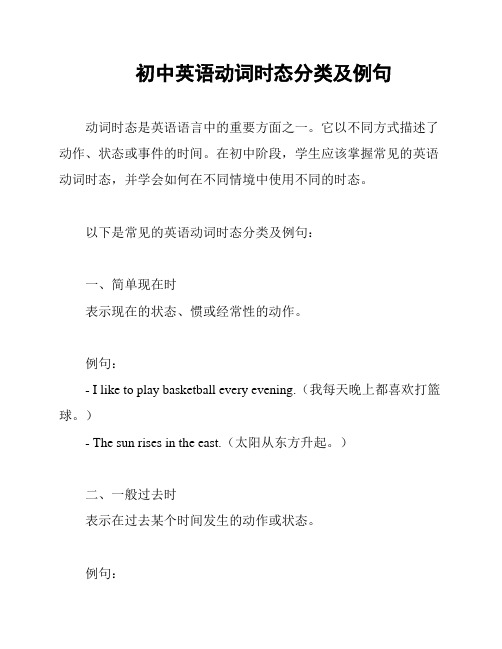
初中英语动词时态分类及例句动词时态是英语语言中的重要方面之一。
它以不同方式描述了动作、状态或事件的时间。
在初中阶段,学生应该掌握常见的英语动词时态,并学会如何在不同情境中使用不同的时态。
以下是常见的英语动词时态分类及例句:一、简单现在时表示现在的状态、惯或经常性的动作。
例句:- I like to play basketball every evening.(我每天晚上都喜欢打篮球。
)- The sun rises in the east.(太阳从东方升起。
)二、一般过去时表示在过去某个时间发生的动作或状态。
例句:- He walked to school yesterday.(昨天他步行去学校了。
)- I visited my grandparents last summer.(我去年夏天拜访了我的祖父母。
)三、现在进行时表示现在正在进行的动作。
例句:- They are watching a movie now.(他们现在正在看电影。
)- She is studying in the library at the moment.(她现在正在图书馆研究。
)四、过去进行时表示过去某个时间正在进行的动作。
例句:- She was teaching in the classroom at 2 pm yesterday.(昨天下午2点她正在教室里上课。
)- I was studying when he called me.(他给我打电话的时候我正在研究。
)五、将来时表示将要发生的动作或状态。
例句:- They will go to Beijing next week.(他们下周将去北京。
)- I am sure she will like the present.(我确信她会喜欢这个礼物。
)六、过去完成时表示过去某个时间之前已经完成的动作。
例句:- She had finished her work by 5 pm.(下午5点她已经完成了她的工作。
初中英语知识点归纳动词的不同时态与语态

初中英语知识点归纳动词的不同时态与语态动词的不同时态与语态是初中英语的重要知识点。
掌握了动词的时态和语态,我们就能更准确地表达过去、现在和将来的动作,以及主语对动作的不同态度。
下面是对初中英语中动词的不同时态与语态的归纳总结。
一、动词的时态1. 一般现在时一般现在时表示经常性或习惯性的动作、客观真理、固定事件等。
例句:- I go to school every day.(我每天去上学。
)- The sun rises in the east.(太阳从东方升起。
)2. 现在进行时现在进行时表示现在正在进行的动作。
例句:- He is watching TV now.(他正在看电视。
)- They are playing basketball in the park.(他们正在公园里打篮球。
)3. 一般过去时一般过去时表示过去发生的动作或存在的状态。
例句:- We watched a movie last night.(昨晚我们看了一场电影。
)- She lived in Beijing when she was young.(她年轻时住在北京。
)4. 过去进行时过去进行时表示过去某个时间正在进行的动作。
例句:- They were having dinner at 7 o'clock yesterday.(昨天7点他们正在吃晚饭。
)- At this time last year, I was studying in London.(去年这个时间,我正在伦敦学习。
)5. 将来时将来时表示将要发生的动作或存在的状态。
例句:- We will go to the beach next week.(下周我们将去海滩。
)- She is going to visit her grandparents tomorrow.(她明天将要去看望她的祖父母。
)二、动词的语态1. 主动语态主动语态表示主语是动作的执行者。
动词时态详解

动词时态详解动词时态是指动词表示的动作或状态所发生的时间。
在英语中,有多种不同的时态,每种时态都有其独特的用法和含义。
以下是对一些常见动词时态的详细解释:1. 现在时态 (Present Tense)- 一般现在时 (Simple Present): 用于表达经常性的动作、客观事实、普遍真理等。
- 现在进行时 (Present Continuous): 用于表示正在进行的动作。
- 现在完成时 (Present Perfect): 用于表示过去发生的动作与现在的关系,强调结果或经验。
- 现在完成进行时 (Present Perfect Continuous): 用于表示过去开始并一直持续到现在的动作。
2. 过去时态 (Past Tense)- 一般过去时 (Simple Past): 用于表达过去发生的动作或状态。
- 过去进行时 (Past Continuous): 用于表示过去某一时刻正在进行的动作。
- 过去完成时 (Past Perfect): 用于表示过去某一动作或状态在另一过去时间点之前发生。
- 过去完成进行时 (Past Perfect Continuous): 用于表示过去某一时间点之前已开始并持续到另一时间点的动作。
3. 将来时态 (Future Tense)- 一般将来时(Simple Future): 用于表示将来发生的动作或状态。
- 将来进行时 (Future Continuous): 用于表示将来某一时刻正在进行的动作。
- 将来完成时 (Future Perfect): 用于表示将来某一时间点之前已经完成的动作。
- 将来完成进行时 (Future Perfect Continuous): 用于表示将来某一时间点之前已开始并持续到另一时间点的动作。
以上是关于常见动词时态的简要说明。
对于每种时态,还有其他细节和规则需要进一步了解和掌握。
在使用动词时态时,确保根据具体语境和需要选择合适的时态,以便准确地表达你的意思。
初中中的动词时态考点解析及解题技巧

初中中的动词时态考点解析及解题技巧动词时态在中学英语学习中是一个重要的考点,正确使用时态不仅可以提高语言表达的准确性,还能使语句更加通顺和流畅。
本文将对初中学生常见的动词时态进行解析,并提供一些解题技巧,帮助学生更好地应对相关考试。
一、一般现在时一般现在时表示经常性、习惯性的动作或存在的状态。
主要的时间状语有always、usually、often 等,常和频率副词连用。
1. 解析题目答案技巧:- 通过关键词判断时态,如always、usually、often 等- 主语为第三人称单数时,动词加-s/-es- 如无时间状语,使用一般现在时。
- 一般疑问句: 将助动词do/does放在句首- 特殊疑问句: 特殊疑问词 + 一般疑问句结构例题:- She (go) to school every day.解析:根据关键词every day 可以判断使用一般现在时。
主语为第三人称单数,所以动词应该变为goes。
答案为goes。
二、一般过去时一般过去时表示过去某个时间发生的动作或状态。
主要的时间状语有yesterday、last week/month/year等。
2. 解析题目答案技巧:- 通过关键词判断时态,如yesterday、last week/month/year等- 一般疑问句: 将助动词did放在句首,动词还原形。
- 特殊疑问句: 特殊疑问词 + 一般疑问句结构例题: - He (play) basketball with his friends yesterday.解析:根据关键词yesterday可判断使用一般过去时。
play的过去式是played。
答案为played。
三、一般将来时一般将来时表示将来某个时间要发生的动作或存在的状态。
主要的时间状语有tomorrow、next week/month/year等。
3. 解析题目答案技巧:- 通过关键词判断时态,如tomorrow、next week/month/year等- 一般疑问句: 将助动词will放在句首- 特殊疑问句: 特殊疑问词 + 一般疑问句结构例题: - We (visit) our grandparents next week.解析:根据关键词next week可判断使用一般将来时。
初一常用动词时态总结及例句分析

初一常用动词时态总结及例句分析动词时态是英语语法中的一个重要概念,它表示动作或状态发生的时间。
在初一阶段,学生们需要学习常用的动词时态,并掌握其正确的使用方法。
本文将对初一常用动词时态进行总结,并提供相应的例句进行分析。
一、一般现在时(Simple Present Tense)一般现在时表示经常性的动作、事实、习惯或普遍真理。
1. 动词规则变化:主语 + 动词原形(第三人称单数加s)例句:- I always go to school by bus.(我总是乘公共汽车去学校。
)- She eats breakfast every morning.(她每天早上吃早餐。
)- Dogs bark.(狗会叫。
)2. 特殊用法:- 表示现在的状态:I am a student.(我是个学生。
)- 表示经常性的真理:The sun rises in the east.(太阳从东方升起。
)二、一般过去时(Simple Past Tense)一般过去时表示过去某个时间发生的动作或状态。
1. 动词规则变化:主语 + 动词过去式例句:- I watched a movie last night.(昨晚我看了一部电影。
)- He played football with his friends yesterday.(昨天他和他的朋友们踢足球。
)- They visited their grandparents last summer.(他们去年夏天拜访了他们的祖父母。
)2. 特殊用法:- 表示过去的习惯:He always ate breakfast at 7 o'clock when he was young.(他年轻时总是在7点吃早饭。
)- 表示过去的真理:Newton discovered the law of gravity.(牛顿发现了万有引力定律。
)三、一般将来时(Simple Future Tense)一般将来时表示将来某个时间会发生的动作或状态。
动词时态详细讲解

动词时态详细讲解
动词时态是指动词在不同的时间和情况下所表现出的不同形式。
以下是英语中常见的时态及其用法:
1. 一般现在时:表示现在的状态或经常发生的动作,如:I study English every day.
2. 一般过去时:表示过去发生的动作或状态,如:I studied English yesterday.
3. 一般将来时:表示将来要发生的动作或状态,如:I will study English tomorrow.
4. 现在进行时:表示正在进行的动作,如:I am studying English now.
5. 过去进行时:表示过去某个时间正在进行的动作,如:I was studying English at 8 o'clock yesterday.
6. 将来进行时:表示将来某个时间正在进行的动作,如:I will be studying English at 8 o'clock tomorrow.
7. 现在完成时:表示过去发生的动作对现在造成的影响或结果,如:I have studied English for 5 years.
8. 过去完成时:表示过去某个时间之前已经完成的动作,如:I had studied English before I came to this school.
9. 将来完成时:表示将来某个时间之前已经完成的动作,如:I will have studied English for 10 years by the end of this year.
以上是英语中常见的时态及其用法,不同的时态可以表示不同的时间和情况,需要根据具体语境来选择合适的时态。
中学重要知识点总结动词时态与语态详解
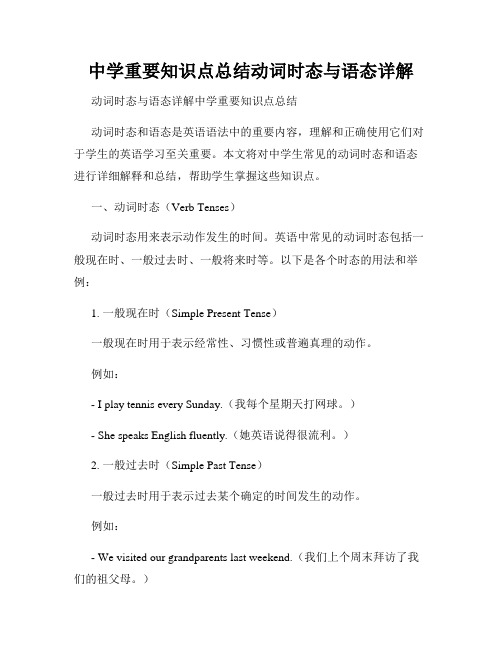
中学重要知识点总结动词时态与语态详解动词时态与语态详解中学重要知识点总结动词时态和语态是英语语法中的重要内容,理解和正确使用它们对于学生的英语学习至关重要。
本文将对中学生常见的动词时态和语态进行详细解释和总结,帮助学生掌握这些知识点。
一、动词时态(Verb Tenses)动词时态用来表示动作发生的时间。
英语中常见的动词时态包括一般现在时、一般过去时、一般将来时等。
以下是各个时态的用法和举例:1. 一般现在时(Simple Present Tense)一般现在时用于表示经常性、习惯性或普遍真理的动作。
例如:- I play tennis every Sunday.(我每个星期天打网球。
)- She speaks English fluently.(她英语说得很流利。
)2. 一般过去时(Simple Past Tense)一般过去时用于表示过去某个确定的时间发生的动作。
例如:- We visited our grandparents last weekend.(我们上个周末拜访了我们的祖父母。
)- He played basketball when he was young.(他年轻时打篮球。
)3. 一般将来时(Simple Future Tense)一般将来时用于表示将来某个时间将要发生的动作。
例如:- They will go to the park tomorrow.(他们明天将去公园。
)- I am sure she will pass the exam.(我相信她会通过考试。
)4. 现在进行时(Present Continuous Tense)现在进行时用于表示现在正在进行的动作。
例如:- She is studying in the library now.(她现在正在图书馆学习。
)- They are playing football on the field.(他们正在场上踢足球。
)5. 过去进行时(Past Continuous Tense)过去进行时用于表示过去某个时间段内正在进行的动作。
初中重要知识点归纳动词时态与语态的用法总结
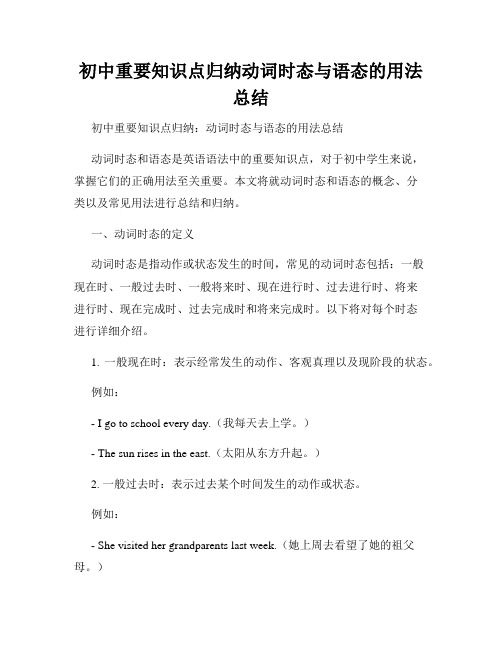
初中重要知识点归纳动词时态与语态的用法总结初中重要知识点归纳:动词时态与语态的用法总结动词时态和语态是英语语法中的重要知识点,对于初中学生来说,掌握它们的正确用法至关重要。
本文将就动词时态和语态的概念、分类以及常见用法进行总结和归纳。
一、动词时态的定义动词时态是指动作或状态发生的时间,常见的动词时态包括:一般现在时、一般过去时、一般将来时、现在进行时、过去进行时、将来进行时、现在完成时、过去完成时和将来完成时。
以下将对每个时态进行详细介绍。
1. 一般现在时:表示经常发生的动作、客观真理以及现阶段的状态。
例如:- I go to school every day.(我每天去上学。
)- The sun rises in the east.(太阳从东方升起。
)2. 一般过去时:表示过去某个时间发生的动作或状态。
例如:- She visited her grandparents last week.(她上周去看望了她的祖父母。
)- They lived in that house for five years.(他们在那个房子里住了五年。
)3. 一般将来时:表示将来某个时间将要发生的动作或状态。
例如:- We will have a party next weekend.(我们下个周末将要举办一次派对。
)- He is leaving for London tomorrow.(他明天将离开去伦敦。
)4. 现在进行时:表示现在正在进行的动作。
例如:- I am reading a book.(我正在读一本书。
)- They are playing basketball in the park.(他们正在公园里打篮球。
)5. 过去进行时:表示过去某个时间正在进行的动作。
例如:- She was studying when I called her.(我给她打电话的时候,她正在学习。
)- We were watching a movie at that time.(那个时候我们正在看电影。
初中英语动词时态总结

初中英语动词时态总结初中英语动词时态总结动词时态是表示动作发生的时间的形式。
在英语中,动词时态分为四种基本时态:一般现在时、一般过去时、一般将来时和现在进行时。
此外,还有一些复合时态,如现在完成时、过去完成时和将来完成时等。
以下是对这些时态的详细总结。
一、一般现在时一般现在时表示经常性或习惯性的动作、客观真理、现实状态或普遍现象。
一般现在时的结构是主语+动词的原形(第三人称单数要加-s)。
1. 经常性或习惯性的动作:She often goes to the park on weekends.2. 客观真理:The earth revolves around the sun.3. 现实状态:I feel tired today.4. 普遍现象:People like to eat chocolate.二、一般过去时一般过去时表示在过去某个时间发生的动作或存在的状态。
一般过去时的结构是主语+动词的过去式。
1. 过去某个时间的动作:They went to the beach last summer.2. 过去存在的状态:She was a teacher before retirement.三、一般将来时一般将来时表示将要发生的动作或存在的状态。
一般将来时的结构是主语+will/won't+动词的原形。
1. 将要发生的动作:I will finish my homework tonight.2. 将要存在的状态:He will be a doctor in the future.四、现在进行时现在进行时表示正在进行的动作。
现在进行时的结构是主语+am/is/are+动词的ing形式。
1. 正在进行的动作:She is reading a book now.2. 临时状态:I am staying with my friends this week.五、现在完成时现在完成时表示过去发生的动作对现在造成的影响或结果。
中考英语语法动词的时态复习讲义及总结与整理
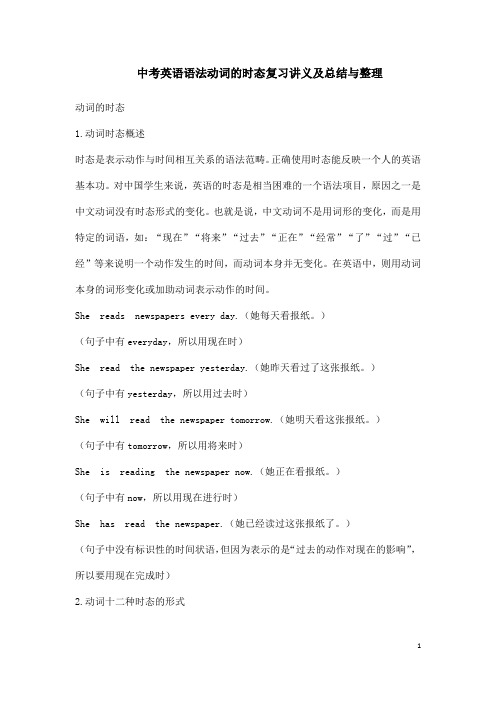
中考英语语法动词的时态复习讲义及总结与整理动词的时态1.动词时态概述时态是表示动作与时间相互关系的语法范畴。
正确使用时态能反映一个人的英语基本功。
对中国学生来说,英语的时态是相当困难的一个语法项目,原因之一是中文动词没有时态形式的变化。
也就是说,中文动词不是用词形的变化,而是用特定的词语,如:“现在”“将来”“过去”“正在”“经常”“了”“过”“已经”等来说明一个动作发生的时间,而动词本身并无变化。
在英语中,则用动词本身的词形变化或加助动词表示动作的时间。
She reads newspapers every day.(她每天看报纸。
)(句子中有everyday,所以用现在时)She read the newspaper yesterday.(她昨天看过了这张报纸。
)(句子中有yesterday,所以用过去时)She will read the newspaper tomorrow.(她明天看这张报纸。
)(句子中有tomorrow,所以用将来时)She is reading the newspaper now.(她正在看报纸。
)(句子中有now,所以用现在进行时)She has read the newspaper.(她已经读过这张报纸了。
)(句子中没有标识性的时间状语,但因为表示的是“过去的动作对现在的影响”,所以要用现在完成时)2.动词十二种时态的形式英语动词共有十六种时态,一般语法书列出的英语动词的十二种时态为“现在”“过去”和“将来”三大类;每类中又分为“一般”“进行”“完成”“完成进行”四种,共十二种,下面以study为例,列表说明。
注意:初中阶段最常用的时态有5种,即一般现在时、一般过去时、现在进行时、一般将来时和现在完成时。
在下面的文章中,将分别讲述各种时态的具体用法。
不规则动词变化表例题:( )1. —When did you meet him? —While I ____ on the street.A. walksB. walkC. was walkingD. am walking( )2. —Mum, why don't you go to sleep? —Your sister ____ yet. I ____ for her.A. hasn't come back; am waitingB. didn't come back; was waitingC. hadn't come back; was waitingD. came back; waited( )3. —King White ___ in our company for 20 years.—Yes, and she ___ here when she was 21 years old.A. has worked; has comeB. worked; comesC. worked; cameD. has worked; came( )4. —Don't forget to visit me when you come here.—OK. I ___ you a call as soon as I ____ there.A. gave; getB. will give; will getC. give; will getD. will give; get( )5. —What did you do last summer vacation?—Don't mention it. I ____ always ____ my parents on the farm.A. was; helpingB. / ; helpedC. would; helpD. have; helped( )6. —Would you like to see the movie? —No, thanks.I ____ it twice.A. have seenB. seenC. sawD. had seen( )7. —Are you still single? —No, I ____ for two months.A. have been marriedB. have marriedC. was marryingD. married( )8. —We will do some cleaning if the weather ___ fine tomorrow.—But I think it ____ rain.A. will be; is going toB. is; is going toC. is; hasD. will be; has( )9. —Mike is preparing his luggage. —Yes. He _____ for Canada on vacation.A. leavesB. leftC. is leavingD. has been away( )10. —Be quiet. Dad ___ in the next room. —Sorry.A. sleepsB. sleptC. is sleepingD. was sleeping参考答案:1-5 CADDA 6-10 AABCC。
初中英语2024届中考语法复习动词时态知识讲解

中考英语语法复习动词时态知识讲解一、时态定义* 时态是英语谓语动词的一种形式,表示动作发生的时间和所处的状态。
* 英语中的时态是通过动词形式本身的变化来实现的。
英语中主要有十六种时态,在初中英语阶段主要掌握六种时态:一般现在时、现在进行时、一般将来时、一般过去时、过去进行时以及现在完成时。
二、一般现在时(一)一般现在时用法:1.一般现在时表示习惯性的动作、讲话时人或物的特性或状态。
Eg: I go to school on foot every day.我每天走路上学She has a cute dog.她又一只可爱的狗。
2.表示自然现象或客观真理时Eg: Light travels more quickly than sound.光的传播速度比声音快。
The Earth goes around the Sun.地球绕着太阳转。
3.在if引导的条件状语从句中,从句用一般现在时Eg: If it rains tomorrow, I will stay at home.如果明天下雨我就呆在家里。
(二)一般现在时的结构1.结构:肯定式:主语 + 谓语动词 + 其它否定式:主语 + don't + 谓语动词 + 其它一般疑问句:Do + 主语 + 谓语动词 + 其它特殊疑问句:特殊疑问词 + 一般疑问句注意:当主语是第三人称单数时,谓语动词要用三单形式,助动词do要变为does。
Eg: 肯定句: I work in Beijing.我在北京工作。
She works in Beijing.她在北京工作。
否定句:I don’t work in Beijing.我不在北京工作。
She doesn’t work in Bejing.她不在北京工作。
一般疑问句:Do you work in Bejing?你在北京工作吗?Does she work in Beijing?她在北京工作吗?特殊疑问句: Where do you work?你在哪工作?Where does she work?她在哪工作?2.动词三单形式变化规则(1)一般情况下直接加-s;Eg: cook -- cooks; work -- works(2)以s, x, ch, sh, o结尾的动词加-es;Eg: catch -- catches; go -- goes; do -- does(3)以辅音加y结尾,将y变成i再加-es;Eg: study -- studies; try -- tries(4)特殊变化:have -- has(三)一般现在时时间标志词一般现在时常与every day, often, usually, always, seldom, sometimes等时间状语连用。
英语动词时态知识点总结
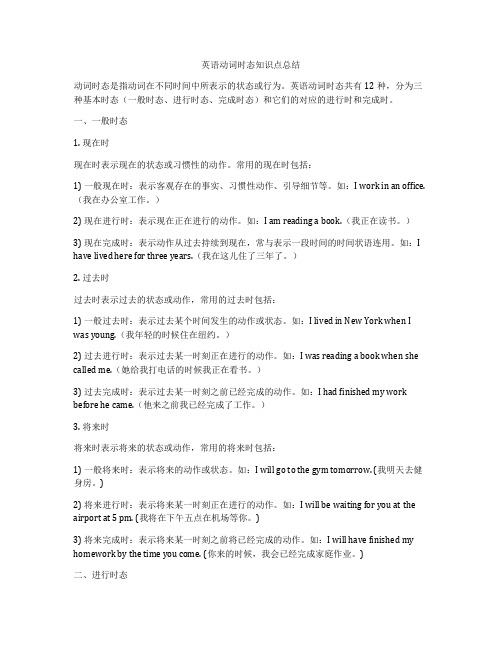
英语动词时态知识点总结动词时态是指动词在不同时间中所表示的状态或行为。
英语动词时态共有12种,分为三种基本时态(一般时态、进行时态、完成时态)和它们的对应的进行时和完成时。
一、一般时态1. 现在时现在时表示现在的状态或习惯性的动作。
常用的现在时包括:1) 一般现在时:表示客观存在的事实、习惯性动作、引导细节等。
如:I work in an office.(我在办公室工作。
)2) 现在进行时:表示现在正在进行的动作。
如:I am reading a book.(我正在读书。
)3) 现在完成时:表示动作从过去持续到现在,常与表示一段时间的时间状语连用。
如:I have lived here for three years.(我在这儿住了三年了。
)2. 过去时过去时表示过去的状态或动作,常用的过去时包括:1) 一般过去时:表示过去某个时间发生的动作或状态。
如:I lived in New York when I was young.(我年轻的时候住在纽约。
)2) 过去进行时:表示过去某一时刻正在进行的动作。
如:I was reading a book when she called me.(她给我打电话的时候我正在看书。
)3) 过去完成时:表示过去某一时刻之前已经完成的动作。
如:I had finished my work before he came.(他来之前我已经完成了工作。
)3. 将来时将来时表示将来的状态或动作,常用的将来时包括:1) 一般将来时:表示将来的动作或状态。
如:I will go to the gym tomorrow. (我明天去健身房。
)2) 将来进行时:表示将来某一时刻正在进行的动作。
如:I will be waiting for you at the airport at 5 pm. (我将在下午五点在机场等你。
)3) 将来完成时:表示将来某一时刻之前将已经完成的动作。
如:I will have finished my homework by the time you come. (你来的时候,我会已经完成家庭作业。
动词的各种时态归纳(含例句及解析)
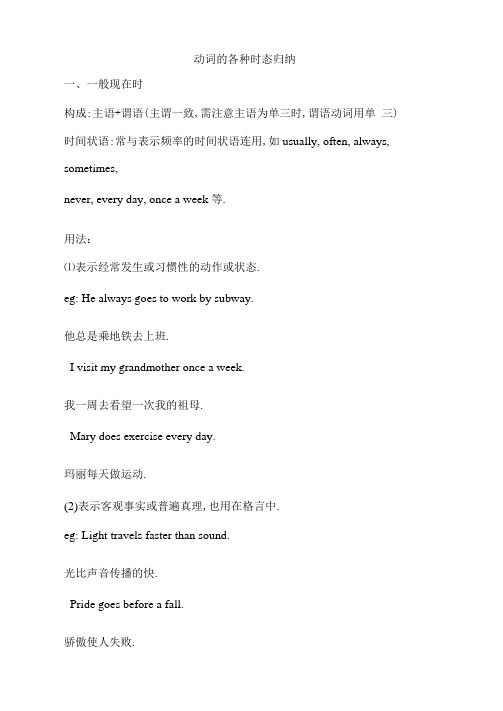
动词的各种时态归纳一、一般现在时构成:主语+谓语(主谓一致,需注意主语为单三时,谓语动词用单三) 时间状语:常与表示频率的时间状语连用,如usually, often, always, sometimes,never, every day, once a week 等.用法:⑴表示经常发生或习惯性的动作或状态.eg: He always goes to work by subway.他总是乘地铁去上班.I visit my grandmother once a week.我一周去看望一次我的祖母.Mary does exercise every day.玛丽每天做运动.(2)表示客观事实或普遍真理,也用在格言中.eg: Light travels faster than sound.光比声音传播的快.Pride goes before a fall.骄傲使人失败.⑶表示按方案或时间表将要发生的事儿,其后常跟表示将来的时间状语. The plane takes off at four PM.飞机下午4点起飞.When does the school begin?学校什么时候开学?(4)表示主语现在的特征性格或状态.Jenny loves music.珍妮喜欢音乐.She lives in a small apartment.他住在一套小公寓里.(5)一些表示心理意识的动词,如know, understand, remember等无进行时,只能用一般现在时表示现在发生的具体行为.eg: I still remember the frightening experience on the island.我仍然记得在那个岛上的可怕经历.⑹在时间和条件状语从句中代替一般将来时.eg: I'll think about it when I write my report.我写报告时会对此予以考虑的.If he comes, I'll let you know as soon as possible.如果他来的话,我会尽快让你知道.二、现在进行时构成:主iu+be+doing时间状语:常与now, right now, at present, at the moment 等时间状语及look, listen等标志词连用.用法:⑴表示说话时正在进行的动作.eg: We are waiting for the subway at the moment.我们现在正在等地铁.Listen! Somebody is singing.听!有人在唱歌.⑵表示现阶段正在进行,而此刻不一定在进行的动作.成语表示一段时间的状语连用,如these days, this week等.eg: How are you getting on with your classmates these days?这些天你和同班同学相处的如何?We are studying French this semester.我们这学期学习语法.⑶某些非延续性动词可以用现在进行时表示即将发生的动作.常用的这类动词有come, go, leave, arrive, start, finish, die 等.这时剧中一般有表示将来的时间状语.eg: They are living by train tonight.他们今晚坐火车走.We are starting work at 8 o'clock next month.下个月我们将8点开始上班.(4)表达特定的感情色彩.现在进行时常与always, continually, constantly, forever等表示频率的副词连用,表示重复的动作,常含有厌烦,不满,抱怨,赞扬等感情色彩.试比拟:She is always scolding her child.她总是训斥自己的孩子.〔不满〕She always scolds her children.他总是训斥自己的孩子.〔事实〕He is constantly doing good work at school.他在学校总是成绩优秀.〔赞扬〕He does good work at school.他在学校成绩优秀.〔事实〕三、现在完成时构成:主语+ha ve/has+done标志词:常与already, just, yet, before, recently, so far, ever, never, once 等连用.用法:⑴表示过去发生的动作,对现在造成的影响或结果.eg: They have already learned two languages.他们己经学会了两种语言.He hasn't made a remark on the structure yet.他尚未对该结构发表评论.I have seen the linguist only once this year.我今年只见过那位语言学家一次.⑵表示从过去某一时间开始持续到现在的动作或状态.常与表示一段时间的状语连用,如so far, up to now, for a long time, for years, since 2021, in the past/ last five years, these days 等. eg: Tom and mary have been friends for years.汤姆和玛丽是多年的朋友.He has lived in London since 2000.自从2000年以来他就住在伦敦.How many words have you learned these days?这些天你学会了多少单词?⑶在时间和条件状语从句中代替将来完成时.eg: I will go to the party as soon as I have finished my homework.我一完成作业就去参加聚会.I will not believe you unless I have seen it with my own eyes.除非亲眼看到,否那么我是不会相信你的.(4)在This/ It is the first /second time that 句式中,that 从句用现在完成时. eg: It's the first time that I have come to Harvard University.这是我第1次来哈佛大学.四、一般过去时构成:主语+动词过去式时间状语:yesterday, last..., ...ago, in+过去年份等.用法:(1)表示过去某个特定时间发生的动作或存在的状态.eg: He offered his seat to an old man.他把他的座位让给了一位老人.He had a nice encounter with that girl last week.上周我与那个女孩有一次美丽的邂逅.⑵表示过去某一段时间内经常性或习惯性的动作.eg: When I was a teenager, I played table tennis almost every day.我十几岁时几乎每天都打乒乓球.⑶在时间和条件状语从句中代替过去将来时.eg: They said they would let us know if they heard any news about him.他们说如果听到关于他的任何消息,他们就会通知我们.五、一般将来时构成:主语+shall/will+动词原形时间状语:常与tomorrow, next week, in the future, in a few days等时间状语连用.用法:表示将要发生的动作或存在的状态.eg: I shall leave for London tomorrow.我明天要去伦敦.A simple test will show if this is real gold.一个简单的测试将会证实这是不是真金.其他表达方式:(1)be going to do表示打算方案安排要做某事,或有迹象说明要发生某事.eg: What are you going to do during the summer holiday?暑假你打算做什么?Look at the dark clouds! It's going to rain.瞧那些乌云!就要下雨了.(2)be about to do表示即将发生的动作,一般不与具体的时间状语连用.eg: Be quiet! The lecture is about to start.安静!讲座马上就要开始了.⑶ be to do表示根据约定责任义务或要求等即将发生的动作. eg: We are to meet at the school gate.我们约好在校门口见.。
初中的归纳与解析常见的动词时态及其用法解析

初中的归纳与解析常见的动词时态及其用法解析动词时态是我们学习英语时必须掌握的重要内容之一。
掌握动词的不同时态以及其正确用法,对我们准确表达意思、流利交流至关重要。
本文将对初中阶段常见的动词时态进行归纳与解析,帮助同学们更好地理解和运用这些时态形式。
一、一般现在时一般现在时表示经常发生的动作、客观事实、以及习惯性的行为。
其结构为主语+动词原形(单三形式加s/es)。
例如:1. I play basketball every Sunday.(我每个星期天打篮球。
)2. She always eats breakfast at 7 o'clock.(她总是七点钟吃早餐。
)3. The sun rises in the east.(太阳从东方升起。
)二、一般过去时一般过去时表示过去某个时间发生的动作或存在的状态。
其结构为主语+动词的过去式。
例如:1. We visited the museum yesterday.(我们昨天参观了博物馆。
)2. He lived in Paris for five years.(他在巴黎住了五年。
)3. They played football after school.(他们放学后踢足球。
)三、一般将来时一般将来时表示将来某个时间会要发生的动作或存在的状态。
其结构为主语+will/shall+动词原形。
例如:1. I will go to the cinema with my friends tomorrow.(明天我将和朋友们去电影院。
)2. They shall finish their homework before dinner.(他们要在晚饭前完成作业。
)3. We will have a meeting next Monday.(下周一我们将开会。
)四、现在进行时现在进行时表示现在正在进行的动作。
其结构为主语+am/is/are+动词-ing形式。
初中英语:动词时态

初中英语:动词时态动词时态是英语语法中的重要部分,它用来表示动作或状态在不同的时间发生。
了解和正确运用动词时态是研究英语语言的关键之一。
英语中常用的动词时态有以下几种:1. 现在时态 (Present Tense):表示现在正在进行或经常发生的动作。
- 现在进行时:表示现在正在进行的动作或情况。
例如:I am eating dinner.- 现在简单时:表示经常发生的动作、客观事实或普遍真理。
例如:___.2. 过去时态 (Past Tense):表示过去发生的动作或情况。
- 过去进行时:表示过去某个时间正在进行的动作。
例如:I was reading a book last night.- 过去简单时:表示过去发生的动作或状态。
例如:___.3. 将来时态 (Future Tense):表示将来要发生的动作或情况。
- 将来进行时:表示将来某个时间正在进行的动作。
例如:They ___.- 将来简单时:表示将来要发生的动作或状态。
例如:___.4. 完成时态 (Perfect Tense):表示过去某个时间已经完成的动作或状态。
- 现在完成时:表示过去发生且与现在有关的动作或状态。
例如:I have ___.- 过去完成时:表示过去某个时间已经完成的动作或状态。
例如:He had already left when I arrived.研究动词时态需要掌握不同的动词形式和对应的用法。
通过阅读和练,我们可以逐渐熟悉各种时态的用法,并在写作和口语中灵活运用。
记住,时态的选择要根据句子的语境和时间关系来确定。
希望以上内容对初中英语动词时态的研究有所帮助!。
初中英语语法知识—动词时态的难题汇编及答案解析(4)

一、选择题1.— Who ________the classroom tomorrow, Tony?— Our group.A.will clean B.cleans C.cleaned D.clean2.John and Mary ________ good eating habits but Eric ________.A.have; don’t B.has; doesn’t C.have; doesn’t D.has; don’t 3.My grandfather ________ live in the countryside, but now he ________ living in the city. A.used to; used to B.was used to; gets used toC.used to; is used to D.was used to; used to4.—Rose, can you give me a hand?—Just a minute. I ______ the followers.A.am watering B.have wateredC.watered D.water5.— How about going for a drive, Mike?— One moment, please! I __________ cleaning our room soon.A.will finish B.have finished C.finish D.finishes 6.— Look at my new watch.—Well, it’s so cool! When and where________you buy it?A.Do B.will C.did D.Are7.Wang Wei often ________ TV on Sunday evenings, but now he is _______ stories. A.watches; reading B.watching; reads C.looks; reading D.watches; looking 8.Monica, you ______ the exam! Congratulation!A.pass B.have passedC.will pass D.are passing9.Which of the following is right?A.He is used to live there.B.My main job is spreading the message about protecting the environment.C.I have borrowed the book from the library for two weeks.D.Kids under 18 are not allowed to drive.10.— Morning, Mike! Did you sleep well last night?— Yes. I went to bed at 9:30 because there ______ a math test this afternoon.A.was B.will be C.is going to have 11.Which of the following sentences is correct?A.He came in and sat down.B.We all like <Harry Potter>.C.When we met. He didn't say hello.D.We went out, headed for the bus stop.12.—How long have you________?—For 10 years, we got married in 2005.A.married B.got married C.been married D.were married 13.The Great Wall (长城) ________ long and it ________ a long history (历史).A.has; is B.is; is C.is; has D.have; has 14.— Have you ever been anywhere for a trip?— A trip? I ________ away from my hometown even once.A.went B.have gone C.have been D.have never been 15.He to the zoo yesterday.A.goes B.go C.goed D.went 16.—Remember the first time we met, Jim?—Of course I do. You ________ in the library.A.were reading B.have read C.will read D.read17.We were in Qingdao last spring and _______ great fun there.A.is having B.are having C.had D.have18.The water ______ cool when I jumped into the pool for morning exercise.A.was felt B.is felt C.felt D.feels19.It’s 8 o’clock. The students _________ an English class.A.have B.having C.is having D.are having 20.—Did you hear the strange noise next d oor around 9 o’clock last night?— No, I ________my favourite film in my bedroom.A.watch B.watched C.am watching D.was watching 21.Don’t talk! The baby ________.A.sleeps B.is sleep C.sleeping D.is sleeping 22.It often __________ in the north of China in winter, and the weather is very cold. A.snowing B.snows C.snowy23.—Do you still play the piano?—Oh, no. I ________it since last year.A.didn’t play B.haven’t played C.don’t play24.When I was young, my mother ___________ by my side all the time.A.stays B.is staying C.stayed D.will stay 25.—I'm sorry. There was too much traffic on the road.—Never mind. The meeting________for only 5 minutes.A.has begun B.has stopped C.has been on【参考答案】***试卷处理标记,请不要删除一、选择题1.A解析:A【解析】【详解】句意:-- Tony,明天谁将打扫教室?--我们组。
动词时态初中英语知识归纳

动词时态初中英语知识归纳英语中的动词时态对于初中学生来说是一个重要的语法知识点。
它涉及到动词的时间和动作状态的表达,对于正确交流和运用英语语言至关重要。
在本篇文章中,我将对初中英语中常见的动词时态进行归纳和解释,帮助学生更好地理解和运用这些时态。
一、一般现在时(Simple Present Tense)一般现在时用来表示经常性、习惯性或普遍的真理。
这个时态的动词变化很简单,主要是加s或es。
例如:I play basketball every weekend.(我每个周末都打篮球。
)和She always brushes her teeth before bed.(她睡前总是刷牙。
)二、一般过去时(Simple Past Tense)一般过去时用来表示过去发生的动作或状态。
它通常需要通过动词的过去式来表示。
例如:We went to the park yesterday.(我们昨天去了公园。
)和He ate an apple for breakfast.(他早饭吃了一个苹果。
)三、一般将来时(Simple Future Tense)一般将来时用来表示将来发生的动作或状态。
主要有两种形式:will + 动词原形和be going to + 动词原形。
例如:I will visit my grandparents next week.(下周我会去看望我的爷爷奶奶。
)和They are going to have a party on Saturday.(他们打算在星期六举办派对。
)四、现在进行时(Present Continuous Tense)现在进行时用来表示正在进行的动作。
它的形式是be + 动词-ing形式。
例如:She is studying in the library now.(她现在正在图书馆学习。
)和We are playing soccer after school.(我们放学后正在踢足球。
- 1、下载文档前请自行甄别文档内容的完整性,平台不提供额外的编辑、内容补充、找答案等附加服务。
- 2、"仅部分预览"的文档,不可在线预览部分如存在完整性等问题,可反馈申请退款(可完整预览的文档不适用该条件!)。
- 3、如文档侵犯您的权益,请联系客服反馈,我们会尽快为您处理(人工客服工作时间:9:00-18:30)。
一、选择题1.— Look after yourself on your way to Gungzhou,dear.— OK, mom.I will call you________get there.A.as soon as B.so that C.because 2.—Look, Tom's parents look so sad.—Maybe they what's happened.A.knew B.have known C.has known D.will know 3.—Rose, can you give me a hand?—Just a minute. I ______ the followers.A.am watering B.have wateredC.watered D.water4.—Mom, can you teach me how to pronounce the words?—Wait a minute. I ________.A.am cooking B.cookC.cooked D.will cook5.—________ a remake (翻拍) of the famous Disney movie Lion King in July, 2019.— Really? I can't wait to see it.A.There will have B.There is going to have C.There will be 6.— Morning, Mike! Did you sleep well last night?— Yes. I went to bed at 9:30 because there ______ a math test this afternoon. A.was B.will be C.is going to have 7.Sorry, Jenny isn’t here. She________ up some lights in the garden.A.put B.puts C.is putting D.has put 8.—I called you at three yesterday afternoon, but you weren’t in.—I ________ a meeting at that time.A.had B.was having C.have had D.would have 9.—I'm sorry. There was too much traffic on the road.—Never mind. The meeting________for only 5 minutes.A.has begun B.has stopped C.has been on 10.Alice always________her notebooks. She is not tidy.A.lose B.lost C.loses D.found 11.—How much is the ticket (票) to Central Park?—One ticket $40, and you can $80 for two persons.A.costs; pay B.cost; spend C.pay; spend D.spends; pay 12.Will you go fishing if it ________ tomorrow?A.did n’t rain B.doesn’t rain C.won’t rain 13.Nick's brother________the navy in 2011and ________the navy since then. A.joined; has joined B.joined in; has joined inC.joined in; has been in D.joined; has been in14.— How is your new coat?— Well, I __________ it on and it fits me well.A.try B.tried C.have tried D.had tried 15.Jack ______ a good rest as soon as he finishes the exam.A.has B.had C.is having D.will have16.Look at Amy. She ________ for the school bus.A.wait B.is waiting C.waits D.waiting 17.We were in Qingdao last spring and _______ great fun there.A.is having B.are having C.had D.have18.The water ______ cool when I jumped into the pool for morning exercise.A.was felt B.is felt C.felt D.feels19.It’s not your turn yet. Please wait on th e chair until you________.A.have called B.will call C.are calling D.are called 20.— Mum, where is Dad?— He _________ flowers in the garden now.A.planted B.plants C.will plant D.is planting 21.—How did the accident happen?—You know, it was difficult to see the road clearly because it________.A.was raining B.has rained C.is raining D.will rain 22.Look! All my classmates ___________ on the playground.A.are running B.ran C.were running D.run23.----Can you tell me how long you_______ the Huawei mobile phone,Mr. Zhang.----Nearly a year. It works very well.A.will buy B.have had C.have bought D.had had24.— Have you ever been anywhere for a trip?— A trip? I ________ away from my hometown even once.A.went B.have gone C.have been D.have never been 25.— Could you please tell me yesterday?— In the bookshop nearby.A.Where you bought the book B.Where you buy the bookC.Where did you buy the book D.Where do you buy the book【参考答案】***试卷处理标记,请不要删除一、选择题1.A【解析】【分析】【详解】句意:——亲爱的,去广州照顾好自己。
——好的,妈妈。
我一到那里就会给你打电话。
考查连词。
as soon as一……就……,引导时间状语从句;so that以便,引导目的状语从句;because因为,引导原因状语从句。
根据句意,此处表示一到达广州就会给妈妈打电话,这里符合主将从现的只有选项A,故选A。
2.B解析:B【解析】【分析】【详解】句意:——看,汤姆的父母看起来很伤心。
——或许他们已经知道发生了什么事。
考查现在完成时。
A. knew一般过去时;B. have known 现在完成时我;C. has known现在完成时;D. will know一般将来时。
根据句意“——看,汤姆的父母看起来很伤心。
——或许他们已经知道发生了什么事。
”可知know的动作发生在过去,对现在造成一定的影响,故时态用现在完成时,其构成为:have/has+动词的过去分词,主语是they,助动词用have,know的过去分词是known;故答案选B。
3.A解析:A【解析】【分析】【详解】句意:——Rose,你能帮我一下吗?——等一下,我正在浇花。
考查现在进行时。
根据语境:“Rose,你能帮我一下吗?”“等一下,我______花。
”可推测是正在浇花,所以用现在进行时。
故答案为A。
4.A解析:A【解析】【分析】【详解】句意:——妈妈,你能教我读这些单词吗?——等会儿。
我正在做饭。
考查动词的时态,am cooking现在进行时;cook动词原形;cooked过去式;will cook一般将来时。
根据句意可知这里应该用现在进行时表示说话时正在做什么,故选A。
5.C解析:C【解析】【分析】句意:——2019年7月,迪斯尼著名电影《狮子王》将重拍。
——真的吗?我等不及要看了。
考查there be句型将来时。
此处是there be句型,在there be句型中不能出现动词have。
排除AB。
根据语境可知是一般将来时的there be句型。
其结构是there will be+主语+介词短语。
根据语境,故选C。
6.B解析:B【解析】【分析】【详解】句意:——早啊,Mike!你昨晚睡得好么?——是的,我9:30就睡觉了,因为今天下午有数学测试。
考查动词时态的用法。
今天下午this afternoon是将来时间,动词用将来式,故排除A;there be句型不与have同用,故排除C。
故选B。
7.C解析:C【解析】【分析】【详解】句意:对不起,珍妮不在。
她正在花园里挂一些灯。
考查动词时态辨析。
put放置,puts是其三单形式,is putting是现在进行时结构,has put 是现在完成时结构。
根据上文“Jenny isn’t here珍妮不在”,可知她正在做别的,需用现在进行时,故选C。
8.B解析:B【解析】【分析】【详解】句意:——昨天下午三点我打电话给你,但你不在。
——我那时正在开会。
